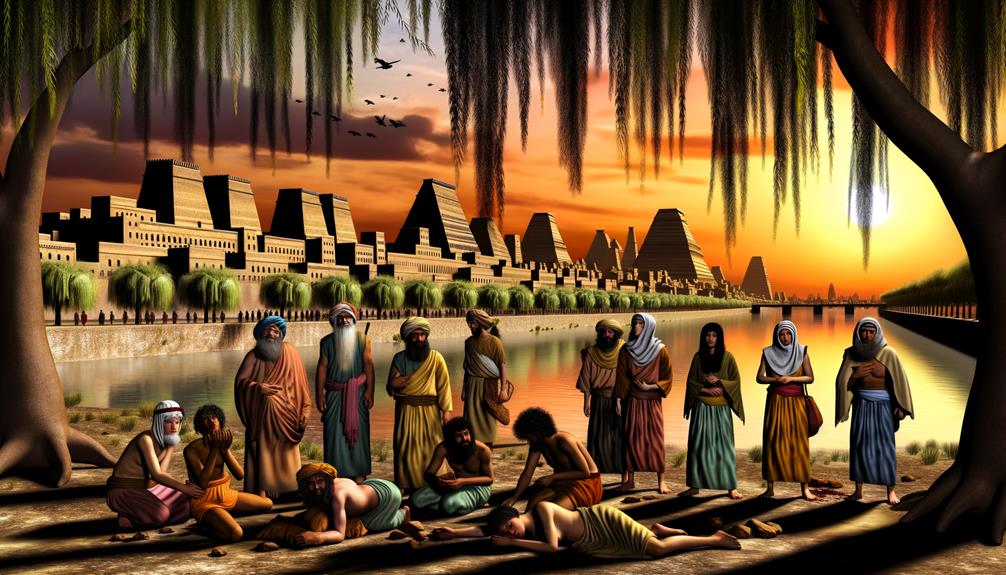By the Rivers of Babylon Bible Verse Meaning: Longing
Psalm 137, beginning with ‘By the rivers of Babylon,’ encapsulates the Israelites’ profound sorrow and yearning during their Babylonian Exile in the 6th century BCE. This verse symbolizes their deep emotional and spiritual displacement, as the rivers of Babylon represent both the physical confinement and emotional turmoil of forced separation from Jerusalem, their spiritual epicenter.
The psalm’s lamentation and imprecations against captors highlight a yearning for justice and divine restoration. Its evocative imagery has influenced music, literature, and art across centuries, making it a poignant reflection on loss, resilience, and the hope for redemption.
Interested readers will uncover layers of communal memory and spiritual introspection.

By the Rivers of Babylon Bible Verse Meaning and Symbolism
| Aspect | Details |
|---|---|
| Bible Reference | Psalm 137:1-4 |
| Key Themes | Exile, longing, sorrow, hope, and restoration |
| Symbolism | Rivers of Babylon represent captivity and loss |
| Historical Context | Reflects the Babylonian exile of the Israelites |
| Spiritual Insight | Expresses the yearning for divine presence and homeland |
Historical Context

In the historical context, ‘By the Rivers of Babylon’ refers to the period of the Babylonian Exile when the Israelites were forcibly removed from their homeland and taken to Babylon. During this time, the Israelites yearned for their homeland and mourned their loss, which is poignantly captured in the text. The exile also sparked deep reflections on identity and faith, influencing their understanding of the divine. The meaning of Babylon in scripture often symbolizes not only captivity and oppression but also the challenges faced by believers in maintaining their faith amid adversity.
This exile, occurring in the 6th century BCE, was a pivotal moment in Jewish history, marking a profound disruption in their social, religious, and cultural life. The forced migration led to significant theological introspection and lamentation, influencing subsequent Jewish thought and scripture.
The rivers of Babylon, particularly the Euphrates and Tigris, symbolize both the physical and emotional landscapes of exile. The Israelites’ displacement fostered a sense of communal identity and resilience, shaping their collective memory and spirituality.
Understanding this historical context is essential for comprehending the emotional depth and significance of the related biblical texts.
Psalm 137 Overview

Psalm 137 offers a poignant reflection on the Jewish exile in Babylon, capturing the profound sorrow and longing for their homeland.
Through an analysis of its historical context, one can better understand the circumstances that led to such a depth of lamentation.
Additionally, the emotional tone of the psalm provides insight into the collective grief and resilience of a displaced people.
Historical Context Analysis
The lamentations of the exiled Israelites captured in Psalm 137 reflect the profound sorrow and yearning for their homeland during the Babylonian captivity. This historical context is pivotal for comprehending the psalm’s depth, as it was composed during a period of immense hardship and displacement.
The Babylonian exile, occurring in the 6th century BCE, was a traumatic event where the Jewish elite were forcibly removed from Jerusalem and taken to Babylon. This period not only stripped the Israelites of their physical home but also challenged their spiritual identity and communal cohesion.
The psalm poignantly reveals the collective anguish and resistance against assimilation, underscoring a resilient hope for return and restoration amid profound loss and cultural disintegration.
Emotional Tone Exploration
Amid the historical backdrop of Babylonian exile, the poignant emotional tone of Psalm 137 vividly captures the Israelites’ profound grief, longing, and resilience. The psalmist’s lament reflects a deep sense of loss and yearning for Jerusalem, interwoven with a resilient hope for future restoration. The emotional intensity is further accentuated by the juxtaposition of sorrowful remembrance and fervent imprecations against their captors.
| Emotional Tone | Verse Example | Interpretation |
|---|---|---|
| Grief | “By the rivers of Babylon…” | Mourning exile and lost homeland |
| Longing | “If I forget you, Jerusalem…” | Deep desire to remember and return |
| Resilience | “Let my right hand forget…” | Commitment to cultural and spiritual identity |
| Anger | “Happy is the one who repays…” | Vindictive wish for retribution |
| Hope | Implied throughout | Hope for eventual deliverance and justice |
This layered emotional spectrum offers a nuanced understanding of the Israelites’ experience.
Israelite Exile

Frequently, the Israelite exile is examined as a pivotal moment in Jewish history that profoundly influenced their spiritual and cultural identity.
The Babylonian Exile (circa 586 BCE) disrupted the socio-religious fabric of the Israelite community, compelling them to re-evaluate their relationship with God and their collective identity. This period of displacement catalyzed the compilation and redaction of significant scriptural texts, including the Torah.
Exile fostered a diasporic consciousness, emphasizing themes of lamentation, hope, and divine justice. The enforced separation from their homeland and Temple not only tested their faith but also reinforced communal bonds and traditions that would endure through subsequent generations.
Consequently, the exile experience remains a cornerstone in understanding Jewish resilience and theological evolution.
Emotional Impact

Experiencing the Babylonian Exile deeply affected the emotional landscape of the Israelite community, infusing their collective consciousness with profound grief, longing, and a persistent quest for meaning amid suffering.
This emotional turmoil is poignantly encapsulated in Psalm 137, where the Israelites lament their displacement and the desecration of their sacred homeland.
Their weeping by the rivers of Babylon symbolizes an intense sense of loss and dislocation, while their inability to sing the Lord’s song in a foreign land underscores a profound identity crisis.
The verse serves as a witness to the communal pain and existential crisis experienced by the exiles, revealing how the trauma of forced migration can reverberate through the cultural and emotional fabric of a displaced people.
Spiritual Significance

What deeper spiritual truths can be discerned from the Israelites’ lamentation by the rivers of Babylon as depicted in Psalm 137? This poignant expression of sorrow transcends mere historical context, reflecting a profound spiritual exile.
It underscores the disconnection from God’s presence and the yearning for divine restoration. The psalm illustrates the Israelites’ recognition of their dependence on divine favor and the significance of Jerusalem, not just as a physical city, but as a spiritual epicenter. This spiritual longing is further emphasized by the psalmist’s lament, reflecting a profound sense of loss and the desire for renewal. Jerusalem, often referred to as the “city on a hill,” symbolizes hope and divine promise, a place where God’s glory is manifested. The city on a hill bible meaning reminds the faithful of the call to be a beacon of light, guiding others toward spiritual awakening and communion with the divine.
Additionally, it serves as a powerful reminder of the communal and individual need for repentance and the hope for ultimate redemption. The lament becomes an enduring reflection of faith’s resilience amidst suffering and the unyielding hope in divine deliverance.
Literary Analysis

The literary structure of Psalm 137 intricately weaves together elements of lamentation, imprecation, and remembrance, forming a compelling narrative that evokes profound emotional and theological responses.
The initial verses, replete with sorrowful recollections of Zion, establish a tone of deep mourning and loss. This lamentation is starkly contrasted by the subsequent imprecations against the oppressors, which reflect the intense yearning for justice and retribution.
The concluding verses, centered on the imperative to remember Jerusalem, underscore the enduring significance of collective memory in the face of exile.
Symbolism in the Verse

The verse ‘By the rivers of Babylon‘ employs potent symbolism to convey themes of exile and longing, with the rivers representing the foreign land where the Israelites find themselves displaced.
The act of weeping beside these rivers symbolizes profound sorrow and remembrance of Zion, their lost homeland.
Additionally, Zion embodies not only a physical place but also a symbol of hope and divine promise, underscoring the Israelites’ yearning for restoration and return.
Exile and Longing
By the rivers of Babylon, the exiled Israelites express profound longing for their homeland, a sentiment deeply embedded in the symbolic imagery of flowing waters and distant shores. The rivers serve as metaphors for both separation and sustenance, reflecting the complex emotional state of a people displaced. The juxtaposition of the lush Babylonian landscape with the arid memory of Zion underscores a poignant sense of loss and yearning.
| Symbol | Interpretation | Emotional Impact |
|---|---|---|
| Rivers | Separation and sustenance | Longing and displacement |
| Babylon | Exile and foreign land | Sense of captivity and loss |
| Zion | Homeland and identity | Yearning and spiritual void |
This evocative imagery not only conveys physical dislocation but also highlights the spiritual and cultural disconnection experienced by the Israelites.
Weeping and Remembrance
Tears shed by the exiled Israelites symbolize not only their profound sorrow but also their deep-seated remembrance of Zion, intertwining grief with a steadfast commitment to their cultural and spiritual identity. This verse encapsulates a rich tapestry of symbolism:
- Sorrow and Loss: The tears signify overwhelming grief for what has been lost.
- Cultural Memory: Weeping serves as a medium to remember and honor their heritage.
- Spiritual Devotion: Tears also represent a form of silent prayer, a yearning for divine intervention.
- Endurance of Identity: Despite displacement, their mourning underscores a resilient attachment to their roots.
This multifaceted symbolism highlights the exiles’ unyielding connection to Zion, making their sorrow a profound reflection of enduring faith and memory.
Zion and Hope
Central to the verse’s symbolism is Zion, representing not only a physical homeland but also a beacon of hope and spiritual aspiration for the exiled Israelites. Zion transcends mere geography, embodying a profound spiritual connection and the collective memory of a sacred past.
In their captivity, the Israelites’ longing for Zion becomes a powerful metaphor for their yearning for divine communion and redemption. This hope sustains their identity and faith, despite their displacement.
The invocation of Zion consequently serves as a poignant reminder of their covenant with God and the anticipated restoration. It underscores the resilience of the human spirit in clinging to hope and spiritual fulfillment amid adversity, reinforcing the enduring importance of faith and memory in maintaining cultural and religious continuity.
Influence on Music

The verse ‘By the rivers of Babylon,’ originating from Psalm 137, has profoundly influenced a diverse array of musical genres, serving as both a direct inspiration and a thematic foundation for numerous compositions throughout history.
This influence can be observed through:
- Classical Music: Composers like Verdi and Dvořák have integrated the psalm’s themes into their works, reflecting its emotional depth.
- Reggae: The Melodians’ song ‘Rivers of Babylon’ became emblematic of resistance and spiritual resilience.
- Pop Music: Boney M.’s rendition popularized the verse, infusing it with a modern, accessible sound.
- Gospel and Spirituals: Numerous hymns and spirituals draw upon the lamentation and hope embodied in Psalm 137.
These examples underscore the psalm’s enduring resonance across musical landscapes.
Cultural References

The biblical verse ‘By the Rivers of Babylon‘ has permeated various cultural domains, manifesting notably in popular song adaptations, literature, and film.
Its evocative themes of exile and lamentation have inspired a range of creative expressions, from the globally recognized reggae rendition by The Melodians to its poignant role in literary works and cinematic narratives.
This exploration will assess how these cultural references reinterpret and perpetuate the verse’s profound emotional and historical resonance.
Popular Song Adaptations
Numerous popular songs have drawn inspiration from the biblical verse ‘By the rivers of Babylon,’ integrating its themes and imagery into various cultural contexts. This verse, originating from Psalm 137, has been adapted to reflect different emotional landscapes and historical moments.
Notable adaptations include:
- Boney M. (1978): This disco hit transformed the lament into a widely recognized song, blending reggae rhythms with haunting lyrics.
- Don McLean (1971): In his album ‘American Pie,’ McLean’s rendition offers a solemn and reflective tone.
- The Melodians (1970): Their reggae version captured the melancholy and resilience of diasporic experiences.
- Sweet Honey in the Rock (1995): This a cappella group emphasized the spiritual and communal aspects of the psalm.
Each adaptation underscores the verse’s versatility, resonating across various musical genres and eras.
Literature and Film
Psalm 137’s evocative imagery and themes have permeated literature and film, serving as a poignant allusion to exile, loss, and longing across diverse cultural narratives.
In literature, authors like T.S. Eliot in ‘The Waste Land’ utilize its motifs to underscore spiritual desolation and cultural disintegration. Similarly, Toni Morrison’s ‘Beloved’ invokes the psalm to explore themes of displacement and the African American experience of slavery.
In film, the psalm’s melancholy resonance is evident in works such as ‘Schindler’s List,’ where it underscores the profound sense of loss and yearning for homeland among Jewish exiles.
These cultural references not only enrich the narrative textures but also invite audiences to engage with the historical and emotional depths encapsulated in Psalm 137.
Modern Interpretations

In contemporary discourse, interpretations of ‘By the Rivers of Babylon’ often reflect broader societal and cultural shifts, revealing its enduring relevance.
Modern scholars analyze the verse through various lenses:
- Historical Context: Examining the verse within the framework of the Babylonian exile provides insights into themes of loss and displacement.
- Psychological Perspective: The text is seen as a reflection of collective trauma and memory, resonating with contemporary experiences of exile and dislocation.
- Sociopolitical Commentary: It is employed to critique modern issues such as forced migration and cultural erasure.
- Religious Symbolism: The verse continues to inspire spiritual reflection, symbolizing divine justice and redemption.
These interpretations highlight the verse’s multifaceted significance in today’s complex world.
Enduring Legacy

Through its persistent resonance across various epochs and cultures, ‘By the Rivers of Babylon’ exemplifies the profound and enduring impact of biblical literature on human consciousness and societal narratives.
Its themes of exile, longing, and hope have transcended their historical context to become universal motifs. The psalm’s evocative imagery has influenced a plethora of artistic expressions, from classical compositions to contemporary music, thereby embedding itself in the cultural fabric.
Additionally, its religious significance provides a touchstone for Jewish and Christian liturgies, symbolizing spiritual perseverance amidst adversity. This enduring legacy underscores the timeless relevance of the psalm, illustrating how sacred texts can shape collective identity and moral reflection across generations, fostering continuity within an ever-evolving historical landscape.
Conclusion
The profound depths of Psalm 137 echo through the annals of history with an intensity unparalleled. The Israelite exile’s anguish, the psalm’s emotional resonance, and its spiritual profundity coalesce into a universal lamentation that transcends time.
From inspiring musical masterpieces to permeating cultural narratives, its influence remains indomitable. Contemporary interpretations continue to unearth its inexhaustible significance, ensuring its place as a timeless witness to human suffering and resilience.
The legacy of Psalm 137 is nothing short of monumental.






